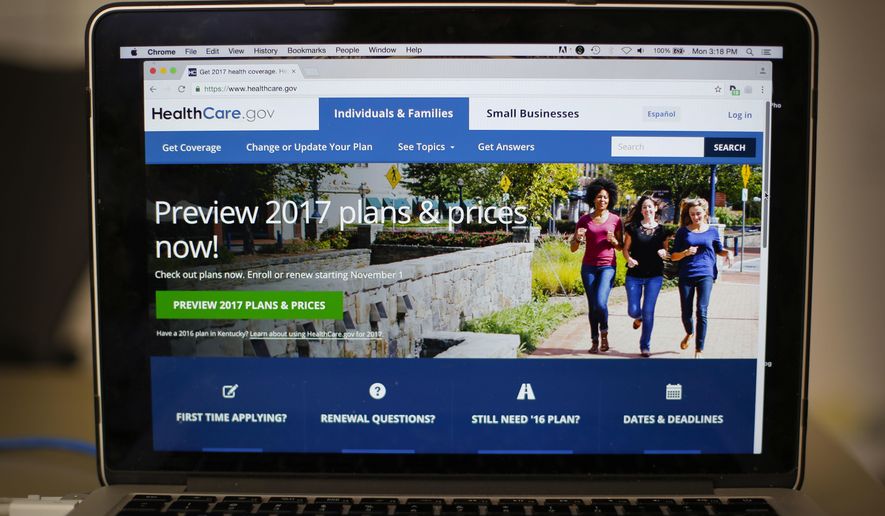Americans support Obamacare’s key benefits but still loathe the “individual mandate” requiring them to buy insurance — the key to making the law’s economics work — according to a new poll that underscores the difficulty Republicans face in trying to repeal it.
More people still dislike the Affordable Care Act than approve of it, by a 45-43 margin, according to the Kaiser Family Foundation’s survey taken after the Nov. 8 election.
The election put the GOP in control of both chambers of Congress and the White House, clearing the way for them to make good on their promise to repeal and replace the 2010 law.
“We need to give the American people relief from Obamacare,” Speaker Paul D. Ryan, Wisconsin Republican, said Thursday, saying dwindling choices and rising premiums under the program are “really hurting families.”
Yet only a quarter of Americans want President-elect Donald Trump and the next Congress to fully repeal the law, the Kaiser poll found, driven by a post-election shift in attitudes among Republicans. Just over a majority of them seek repeal, compared to nearly seven in 10 in October, while the share of Republicans who want lawmakers to scale back what the law does jumped from 11 percent to 24 percent.
Mr. Trump has said he wants to preserve a pair of Obamacare provisions that enjoy majority support from Republicans and Democrats alike — allowing young adults to stay on their parents’ insurance plans until age 26 and barring insurers from turning away sick customers.
He’s also endorsed Republican efforts to use “market-oriented” reforms to entice people into plans instead of using the individual mandate that was included in Obamacare to prod healthy people into its web-based exchanges.
Yet the Obama administration and its progressive allies say that’s easier said than done. They said Republicans will struggle to fiddle with the “three-legged stool” approach: requiring insurers to cover customers who are already sick, using the mandate to force healthy customers to balance out the sick ones, and then offering taxpayer-funded subsidies to help cover some of the costs.
“I think Republicans are figuring out how hard it is, both politically and from a policy perspective, to repeal the Affordable Care Act. If you try to repeal the mandate and the subsidies, while keeping the ban on discrimination against sick people, the whole insurance market collapses,” said Sen. Christopher Murphy, Connecticut Democrat. “I think they’re in an impossible position given Trump’s comments before and after the campaign.”
Republicans argue the mandate was not only unpopular but ineffective in holding premiums down.
Sen. Cory Gardner, Colorado Republican, said there is emerging consensus on how the GOP can preserve the aspects of health care reform that people like but without resorting to onerous mandates. That includes age-based tax credits to help poorer people obtain coverage while providing federal funding for high-risk pools to support sicker consumers who’ve been priced out of coverage.
“I think elements of those have been a part of every replacement plan put forward,” Mr. Gardner said.
The House GOP’s “Better Way” plan would entice consumers into coverage by allowing them to shop across state lines and use tax credits on any plan they want instead of ones that meet minimum coverage requirements from Washington.
Yet bridging the divide between repeal and replace is already posing a challenge for Republicans, who must decide whether to finalize an Obamacare alternative before they kick-start efforts to fulfill their campaign vow and dismantle the law.
Two-thirds of Americans who want Congress to repeal Obamacare want to see it replaced, according to Kaiser, with 42 percent of them saying lawmakers should have a replacement in hand, with 21 percent saying the replacement can come later.
Sen. Lamar Alexander, a Tennessee Republican who is chairman of the Health Committee, said he wants to see repeal and replace happen at the same time.
Yet House Majority Leader Kevin McCarthy suggested this week that Congress could repeal immediately, with a “transition” period to allow time for consensus on an alternative.
He said repeal only takes a majority vote, using budget fast-track rules, while replacement would likely need to achieve 60 votes to head off an expected Democratic filibuster.
Repealing first could also force Democrats to the negotiating table if they’re given a deadline to transition.
Some Democrats are already spoiling for a fight, however, warning Republicans that they’ll be responsible if insurers ditch a politically doomed law before Congress figures out how to cover the millions of people in the exchanges.
“This idea that you can repeal the Affordable Care Act and postpone its effective date for two years is likely a fiction,” Mr. Murphy said. “The markets will begin to unravel and collapse.”
• Tom Howell Jr. can be reached at thowell@washingtontimes.com.




Please read our comment policy before commenting.